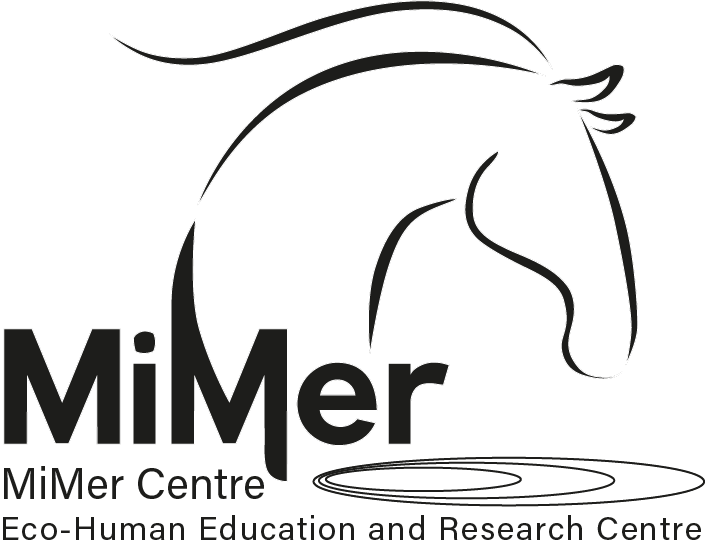Ethics
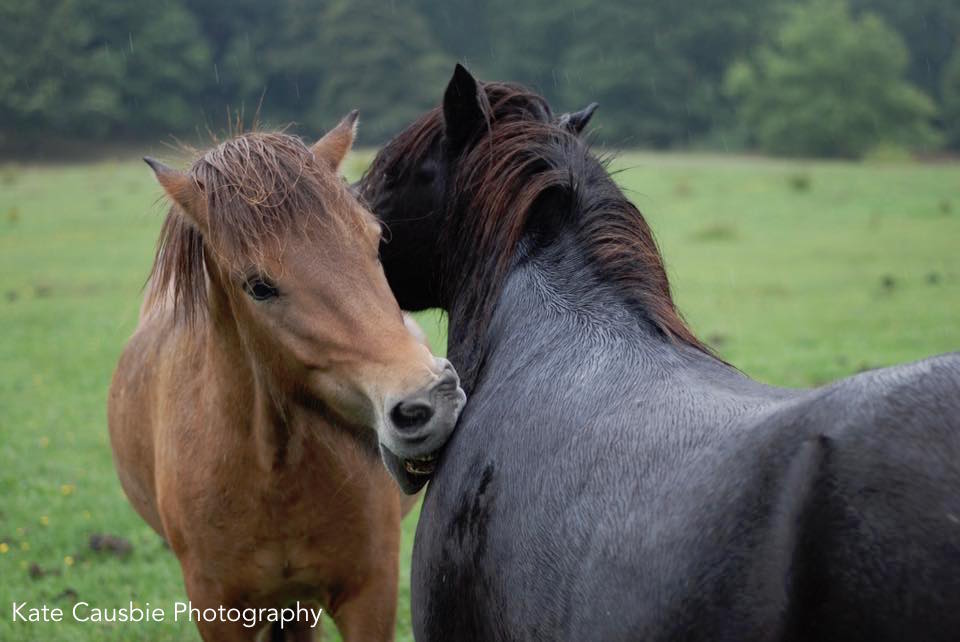 One of MiMer Centre’s passions and objectives is to spread and improve ethics in the world of equines. What do ethics mean in regard to equines? Ethics explain the way how we fairly treat equines, including the discussions of what is "right" and what is "wrong", what we accept and what we don't. Further, the welfare of equines is part of ethics. Equine welfare includes the way how we treat them, and what are their living conditions.
One of MiMer Centre’s passions and objectives is to spread and improve ethics in the world of equines. What do ethics mean in regard to equines? Ethics explain the way how we fairly treat equines, including the discussions of what is "right" and what is "wrong", what we accept and what we don't. Further, the welfare of equines is part of ethics. Equine welfare includes the way how we treat them, and what are their living conditions.
Although humans and equines are different, we also share quite a bit from our mammalian background. We do not see the horse only as a flight animal as it is often described. As humans, equines are social, emotional, and cognitive beings. That is why it is crucial to critically evaluate the way how we keep and treat our beloved equines.
Research and science can provide more objective lenses through which we can look at the way how we keep, treat, and understand horses.
But how can we get closer to improved ethics and welfare of the equines? We believe in education, continuing education, and staying open and curious towards new knowledge. MiMer Centre supports research and education that is based on science. By educating ourselves this way, supported by research and science, we can find more sustainable ways to be with equines, improve their conditions, and understand them in more thorough ways.
At MiMer Centre we believe that through better welfare of the equines we can also provide better treatment for the humans, ultimately improving the welfare of all.
Board of Ethics
We are a network of people in different parts of the world ready to help you with ethics and welfare-related questions, advice, and further assessments. You can find our network here.
Horsekeeping
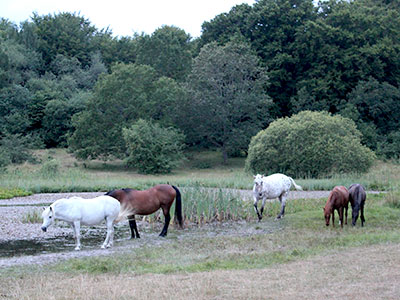
Since 2005 all of our horses have been living outdoors in a pasture with a shelter, 24 hours a day, all year round. They live all together in a single herd, the big and the small, the young and the old and the mares and the geldings. Good quality roughage is always accessible for them without time limitations. We have chosen this way of "housing" them because we see the number of benefits that it brings to their lives.
What benefits do we see with our choice of keeping horses compared to the traditional way of keeping horses stabled?
Horses become healthier
• They have less respiratory issues that many horses get from badly ventilated stables (dusty shavings, hay, straw, ammonia, etc.)
• They have a smaller chance of catching infections
• They do not get swollen legs because of being stagnant
• They do not get behavioral disorders such as crib-biting, weaving, stall walking, head shaking etc.
• They do not get stall-related injuries from rolling, getting stuck in stable structures, slipping on concrete floors etc.
• They have a smaller chance to get colic
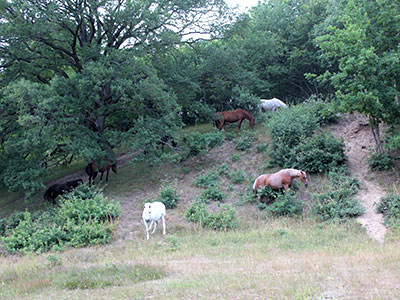 Horses socialize in a herd
Horses socialize in a herd
• They can scratch, clean and help to repel flies with each other
• They can play
• They can relax and rest
• They can just be with their best friends.
Horses can behave the way as nature intended
• They can roll
• They can search for food
• They can socialize
• They can stand, walk, run, rest, etc. whenever they want
• They do not stand at the gate waiting to be taken to the stable to eat
They become stronger with better muscles - and better hooves
• It is natural for a horse to walk long distances every day. Horses have a better chance for that in large natural pastures.
• It strengthens bones, tendons, and ligaments, which is important for all horses, but perhaps most important for the young growing horse
• The horses' hoof quality becomes better, especially if they go barefoot - which in turn has a positive impact on the horse’s overall wellbeing
The horses become safer to handle
• It is safer to go into a pasture where horses live 24/7, all year round, to pick up a horse –than to a paddock where horses stay only for a relatively short period of time per day
• They want to come and join - they do not try to get away from people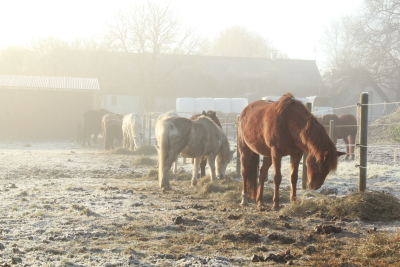
• They are always in their herd in their "free time" - and feel secure in it
People get more time to socialize with the horses
• When you muck out, you are together with the horses
• You also do not muck as many hours a day as in the stable
• It is also better for your health to muck outdoors than indoors (dust & ammonia)
The horses feel better about free access to food
• They will be not so fixed on food
• They eat/graze whenever they want
• They get the most they need and therefore they get little or no industrial feed/supplements
• Their gastrointestinal tract does well
• They do not need any blankets (at least not the healthy ones, and not all of the old ones because the majority of the heat of a horse comes from within, warming themselves as they eat)
Want to know more about our horsekeeping? contact Katarina Felicia Lundgren, This email address is being protected from spambots. You need JavaScript enabled to view it., +46 (0)46-532 43, +46 (0)768-95 98 68
Ethics in Training/Riding
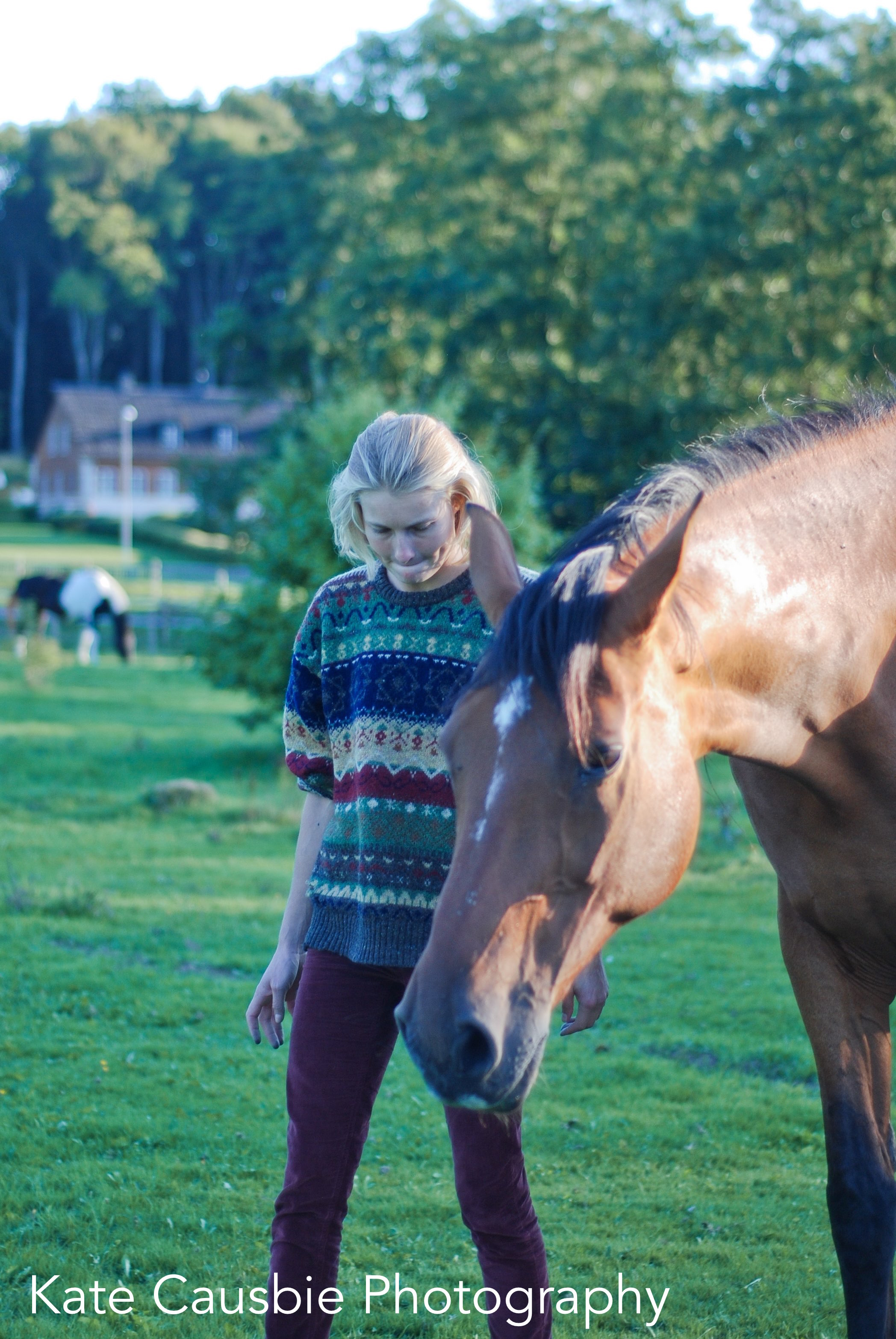 When we consider ethics in training and riding (if we choose to ride) it is important to consider what are we looking for in training? Obedience? Perfect movement? Relationship? Enrichment? What are the motives and goals for the things we have chosen to focus on? Does the horse benefit from it in some way? Have we considered how it could look like from the horse’s point of view?
When we consider ethics in training and riding (if we choose to ride) it is important to consider what are we looking for in training? Obedience? Perfect movement? Relationship? Enrichment? What are the motives and goals for the things we have chosen to focus on? Does the horse benefit from it in some way? Have we considered how it could look like from the horse’s point of view?
We at MiMer Centre emphasize the horse’s autonomy. That means that the horse can have a choice and a say in the things what we choose to do. In this way, we let the horse be a horse and express himself, without shutting him down (e.g. could lead to learned helplessness or heightened reactivity). We do not aim for 100% obedience but for mutual co-operation and reciprocity. It is important to allow the horse to express himself, let him explore and fulfill his natural needs and tendencies for curiosity. Horses make sense of their surroundings by e.g. sniffing and smelling. There is no need to punish a horse for doing that.
Understanding the horse from other perspectives than only riding/training helps us to understand the horse also in training and riding situations. MiMer Centre highly supports education based on research and science.
Many traditional training methods are shown to increase emotional reactivity, aggressiveness and stereotypical and defensive behaviors (e.g. head shaking, mouth opening, tail swishing, pinned ears etc.). Can we recognize the signs of discomfort in horses? If we do, what can we do to change the situation?
Unfitting tack is often causing behavioral problems and can lead to significant physical damage. Thus, fitting tack properly is extremely important. Also, asking what tack and why to use it is necessary in order to ensure the welfare and wellbeing of the horse. Often, less is more. Are the shoes, bits, brushing/tendon boots, martingales etc. justifiable, or does the root of the problem lie somewhere else? Unnecessary tack can cause non-beneficial movement patterns and further physical damage.
One of the most important things to consider in training is remembering to give the horse time without an agenda, without goals, and to devote time for just being to get to know the horse for who he is.
Ethics in Therapy
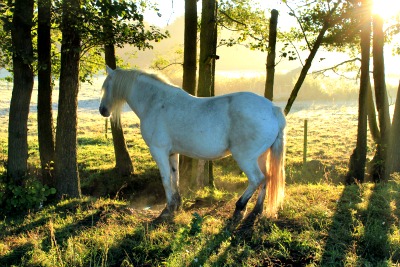 Ethics are essential in therapy to ensure the welfare and wellbeing of both equine and human participants. Better welfare of equines in therapy leads to better welfare of humans and the other way around.
Ethics are essential in therapy to ensure the welfare and wellbeing of both equine and human participants. Better welfare of equines in therapy leads to better welfare of humans and the other way around.
In therapy situations at MiMer Centre, there is both human professional (therapist) and an equine professional/specialist present with the client. Understanding and noticing the signs of discomfort/pain/stress in equines ensure the wellbeing of the horses participating in the sessions.
The treatment sessions are done in the pasture with the herd of horses without restricting equipment. The horses are free to choose whether they participate in the session or not, for how long, and they are not restricted in case they want to return to their friends, grazing etc. whenever they choose to do so.
Agency, again for both humans and equines, is very important for us at MiMer Centre. The horse is also a subject, and thus the objectification and instrumentalization of him should be avoided at all costs.
We aim to create living conditions for the horses where their biological, emotional, social and cognitive welfare and wellbeing can be met, and offer a space for the equines where they can also grow through the work that they do.
